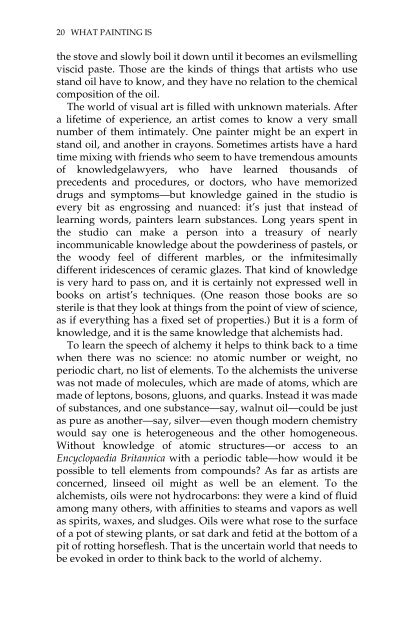What Painting Is: How to Think about Oil Painting ... - Victoria Vesna
What Painting Is: How to Think about Oil Painting ... - Victoria Vesna
What Painting Is: How to Think about Oil Painting ... - Victoria Vesna
Create successful ePaper yourself
Turn your PDF publications into a flip-book with our unique Google optimized e-Paper software.
20 WHAT PAINTING IS<br />
the s<strong>to</strong>ve and slowly boil it down until it becomes an evilsmelling<br />
viscid paste. Those are the kinds of things that artists who use<br />
stand oil have <strong>to</strong> know, and they have no relation <strong>to</strong> the chemical<br />
composition of the oil.<br />
The world of visual art is filled with unknown materials. After<br />
a lifetime of experience, an artist comes <strong>to</strong> know a very small<br />
number of them intimately. One painter might be an expert in<br />
stand oil, and another in crayons. Sometimes artists have a hard<br />
time mixing with friends who seem <strong>to</strong> have tremendous amounts<br />
of knowledgelawyers, who have learned thousands of<br />
precedents and procedures, or doc<strong>to</strong>rs, who have memorized<br />
drugs and symp<strong>to</strong>ms—but knowledge gained in the studio is<br />
every bit as engrossing and nuanced: it’s just that instead of<br />
learning words, painters learn substances. Long years spent in<br />
the studio can make a person in<strong>to</strong> a treasury of nearly<br />
incommunicable knowledge <strong>about</strong> the powderiness of pastels, or<br />
the woody feel of different marbles, or the infmitesimally<br />
different iridescences of ceramic glazes. That kind of knowledge<br />
is very hard <strong>to</strong> pass on, and it is certainly not expressed well in<br />
books on artist’s techniques. (One reason those books are so<br />
sterile is that they look at things from the point of view of science,<br />
as if everything has a fixed set of properties.) But it is a form of<br />
knowledge, and it is the same knowledge that alchemists had.<br />
To learn the speech of alchemy it helps <strong>to</strong> think back <strong>to</strong> a time<br />
when there was no science: no a<strong>to</strong>mic number or weight, no<br />
periodic chart, no list of elements. To the alchemists the universe<br />
was not made of molecules, which are made of a<strong>to</strong>ms, which are<br />
made of lep<strong>to</strong>ns, bosons, gluons, and quarks. Instead it was made<br />
of substances, and one substance—say, walnut oil—could be just<br />
as pure as another—say, silver—even though modern chemistry<br />
would say one is heterogeneous and the other homogeneous.<br />
Without knowledge of a<strong>to</strong>mic structures—or access <strong>to</strong> an<br />
Encyclopaedia Britannica with a periodic table—how would it be<br />
possible <strong>to</strong> tell elements from compounds? As far as artists are<br />
concerned, linseed oil might as well be an element. To the<br />
alchemists, oils were not hydrocarbons: they were a kind of fluid<br />
among many others, with affinities <strong>to</strong> steams and vapors as well<br />
as spirits, waxes, and sludges. <strong>Oil</strong>s were what rose <strong>to</strong> the surface<br />
of a pot of stewing plants, or sat dark and fetid at the bot<strong>to</strong>m of a<br />
pit of rotting horseflesh. That is the uncertain world that needs <strong>to</strong><br />
be evoked in order <strong>to</strong> think back <strong>to</strong> the world of alchemy.


